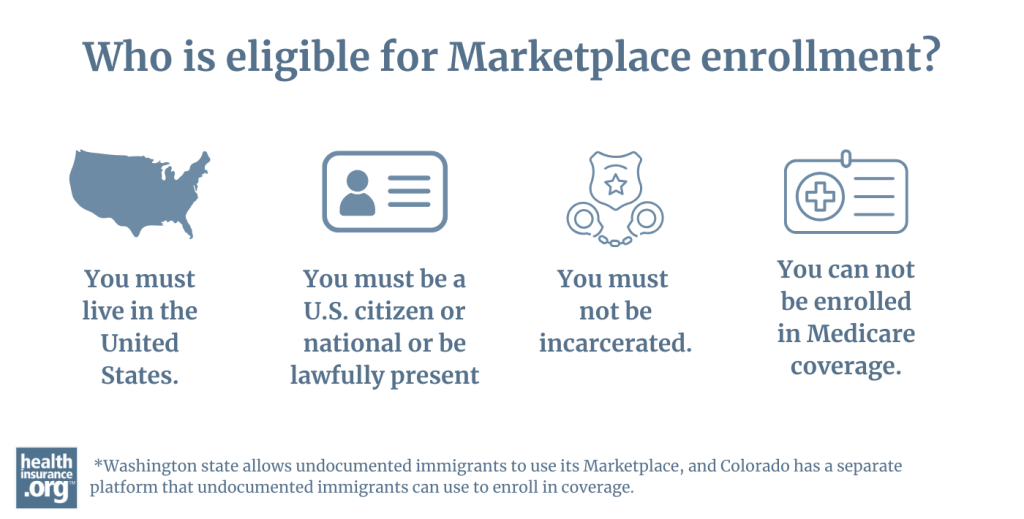ACA Open Enrollment 2025 Guide

Here’s what you need to know about open enrollment for individual and family health coverage

What is the Affordable Care Act’s open enrollment?
The Affordable Care Act’s (referred to as ACA or Obamacare) open enrollment period is the annual window during which individuals and families can compare the various health plans that are available and select the one that will best fit their needs for the coming year.
The open enrollment period typically runs from November 1 through January 15, but the dates vary in some states that run their own exchanges.
See our guide on open enrollment period deadlines for each state.
Note that to have a January 1, 2025 effective date, you had to enroll by December 18, 2024 in most states. You could still enroll in early January 2025 and have a February 1 effective date in every state except Idaho. (Enrollment for 2025 coverage in Idaho now requires a special enrollment period.)
Learn more about the state-by-state enrollment deadlines for a February 1, 2025 effective date.
The open enrollment window applies to plans sold through the Marketplace/exchange as well as plans purchased off-exchange, directly from an insurance company.
Outside of open enrollment, you can only sign up for ACA-compliant individual and family health insurance (or switch to a different plan) if you’re eligible for a special enrollment period, most of which are triggered by qualifying life events.
Learn more about special enrollment periods and qualifying life events.
How much could you save on 2025 coverage?
Compare health plans and check subsidy savings from a third-party insurance agency.



When is open enrollment for my state?
In the majority of the states, open enrollment for 2025 coverage ran from November 1, 2024 through January 15, 2025. But some state-run exchanges have different schedules.1 You can see the deadlines for each state in the table below.
| State | Open Enrollment Period for 2025 Coverage | |
|---|---|---|
| Alabama | November 1, 2024 – January 15, 2025 | |
| Alaska | November 1, 2024 – January 15, 2025 | |
| Arizona | November 1, 2024 – January 15, 2025 | |
| Arkansas | November 1, 2024 – January 15, 2025 | |
| California | November 1, 2024 – January 31, 2025 | |
| Colorado | November 1, 2024 – January 15, 2025 | |
| Connecticut | November 1, 2024 – January 15, 2025 | |
| Delaware | November 1, 2024 – January 15, 2025 | |
| District of Columbia | November 1, 2024 – January 31, 2025 | |
| Florida | November 1, 2024 – January 15, 2025 | |
| Georgia | November 1, 2024 – January 15, 2025 | |
| Hawaii | November 1, 2024 – January 15, 2025 | |
| Idaho | October 15, 2024 – December 16, 2024* | |
| Illinois | November 1, 2024 – January 15, 2025 | |
| Indiana | November 1, 2024 – January 15, 2025 | |
| Iowa | November 1, 2024 – January 15, 2025 | |
| Kansas | November 1, 2024 – January 15, 2025 | |
| Kentucky | November 1, 2024 – January 15, 2025 | |
| Louisiana | November 1, 2024 – January 15, 2025 | |
| Maine | November 1, 2024 – January 15, 2025 | |
| Maryland | November 1, 2024 – January 15, 2025 | |
| Massachusetts | November 1, 2024 – January 23, 2025 | |
| Michigan | November 1, 2024 – January 15, 2025 | |
| Minnesota | November 1, 2024 – January 15, 2025 | |
| Mississippi | November 1, 2024 – January 15, 2025 | |
| Missouri | November 1, 2024 – January 15, 2025 | |
| Montana | November 1, 2024 – January 15, 2025 | |
| Nebraska | November 1, 2024 – January 15, 2025 | |
| Nevada | November 1, 2024 – January 15, 2025 | |
| New Hampshire | November 1, 2024 – January 15, 2025 | |
| New Jersey | November 1, 2024 – January 31, 2025 | |
| New Mexico | November 1, 2024 – January 15, 2025 | |
| New York | November 1, 2024 – January 31, 2025 | |
| North Carolina | November 1, 2024 – January 15, 2025 | |
| North Dakota | November 1, 2024 – January 15, 2025 | |
| Ohio | November 1, 2024 – January 15, 2025 | |
| Oklahoma | November 1, 2024 – January 15, 2025 | |
| Oregon | November 1, 2024 – January 15, 2025 | |
| Pennsylvania | November 1, 2024 – January 15, 2025 | |
| Rhode Island | November 1, 2024 – February 28, 2025 | |
| South Carolina | November 1, 2024 – January 15, 2025 | |
| South Dakota | November 1, 2024 – January 15, 2025 | |
| Tennessee | November 1, 2024 – January 15, 2025 | |
| Texas | November 1, 2024 – January 15, 2025 | |
| Utah | November 1, 2024 – January 15, 2025 | |
| Vermont | November 1, 2024 – January 15, 2025 | |
| Virginia | November 1, 2024 – January 22, 2025 | |
| Washington | November 1, 2024 – January 15, 2025 | |
| West Virginia | November 1, 2024 – January 15, 2025 | |
| Wisconsin | November 1, 2024 – January 15, 2025 | |
| Wyoming | November 1, 2024 – January 15, 2025 | |
*To comply with new federal rules, Your Health Idaho confirmed by email that they would enroll people until December 31, 2024, if the applicant called the Your Health Idaho call center.
How to enroll in the Marketplace
During open enrollment, you can enroll in an ACA-compliant individual and family health insurance plan – or make changes to your existing coverage – through the Marketplace in your state.

- If you have specific doctors or medical facilities you want to use, check to see if any plans have them in-network. If you take any medications, check to see if any plans have them in their formularies and what the out-of-pocket costs will be.
- If you want help with the process, assistance is available via local insurance brokers and Navigators, as well as enhanced direct enrollment entities.
Learn more about how to choose the best health plan for your situation.


Here’s what you’ll need for each enrollee:
- Name, Address, Social Security Number (Here’s why it’s required.) and Birth date
- Citizenship or legal residency status. (Proof may be required.)
- Payment information for the first month’s premium. (Setting up automatic payments for future months can help you avoid an inadvertent lapse in coverage.)
- If you’re 30 or older and want a catastrophic plan, you’ll need a hardship exemption.2
- Many applicants are eligible for financial assistance.3 If you’re applying for subsidies, you’ll also need the number of people on your tax return and your total household income. (The Marketplace may require proof of your income through a variety of documentation,4 and coverage details about any employer-sponsored coverage available to you.)


- You can do this yourself or have a broker, Navigator, or enrollment assister help you with the process.
- You can apply online, over the phone, submit a paper application, or enroll in-person with a local broker, Navigator, or enrollment assister.
- You will not need to answer any medical history questions. But be sure that the plan you’re selecting has your medical providers in-network, covers your medications, and has out-of-pocket costs that you’ll be able to manage.


- Log into your Marketplace account after you’ve completed the process, to make sure everything is in order.
- Watch your email and mail for communications from the Marketplace and your new insurer. (For example, you may be asked to provide documentation to verify income or legal residency).
- Once your policy and ID cards arrive in the mail, read through all of it and reach out to your broker, Navigator, or the health plan if you have questions.

Frequently asked questions about Obamacare open enrollment
Who is eligible for Marketplace enrollment?
To be able to enroll on the ACA’s Marketplace:5
- You must live in the United States.
- You must be a U.S. citizen or national or be lawfully present (Washington state allows undocumented immigrants to use its Marketplace, and Colorado has a separate platform that undocumented immigrants can use to enroll in coverage6).
- You must not be incarcerated.
- You can not be enrolled in Medicare coverage.
In DC and 31 states, DACA recipients are allowed to use the Marketplace and obtain income-based subsidies for 2025, and could sign up for Marketplace coverage starting November 1, 2024.
This was supposed to be available nationwide, under a rule change the Biden administration had implemented earlier in 2024. But in December 2024, a federal judge in North Dakota blocked the rule allowing Marketplace access for DACA recipients in 19 states that had challenged the rule in court7 A preliminary stay was issued in that case the following week, meaning that DACA recipients could once again enroll in Marketplace coverage nationwide, but that was short-lived. In late December 2024, the stay was vacated.
So in the 19 plaintiff states, DACA recipients are not eligible to use the Marketplace. Those states are Alabama, Arkansas, Florida, Idaho, Indiana, Iowa, Kansas, Kentucky, Missouri, Montana, Nebraska, New Hampshire, North Dakota, Ohio, South Carolina, South Dakota, Tennessee, Texas, and Virginia. Residents of those states who enrolled before the court ruling will be refunded for any premiums they paid and their enrollments will be terminated.8

Who is eligible for financial assistance when buying coverage through the Marketplace?
Being eligible to enroll in the Marketplace is not the same as being eligible for financial assistance. In short, the income-based subsidies available through the Marketplace/exchange are reserved for people who aren’t eligible for Medicaid, zero-premium Medicare Part A, or coverage offered by an employer that’s deemed affordable and comprehensive. (Here’s how to determine whether employer-sponsored coverage is affordable to you.)
What is a premium subsidy and how do I get financial help during open enrollment?
Premium subsidy rules are designed to ensure that subsidy-eligible individuals won’t pay more than 8.5% of their household income in premiums for the benchmark (second-lowest-cost Silver) plan in the Marketplace.9 (The percentage of household income that people are expected to pay can be much lower – as low as 0% – depending on their income.)9
You can use our subsidy calculator to get an idea of whether you’re eligible for premium subsidies, and if so, how much those subsidies could be.
Premium subsidies are a refundable tax credit.10 You may qualify for a subsidy based on your projected household income for the year you’ll have coverage. And then you’ll need to reconcile that with the IRS when you file your tax return for that year, based on your actual income.11
Marketplace cost-sharing reductions (CSR)12 are another type of Obamacare subsidy. CSR assistance is designed to ensure that people with low to moderate incomes can afford to receive health care services. Enrollees who qualify for CSR usually also qualify for premium subsidies.
CSR subsidies result in lower out-of-pocket costs, including lower deductibles and copays. For applicants with eligible incomes, these subsidies are automatically incorporated into all of the available Silver-level plans. But if you’re eligible for CSR subsidies and you buy a metal plan other than a Silver plan, you’ll forfeit this advantage
In addition to federal premium subsidies and CSR subsidies, some state-run Marketplaces offer their own subsidies.
I have Medicare. Can I buy supplemental insurance through the ACA Marketplace during open enrollment?
No. It is unlawful for someone to sell you a Marketplace plan (or an individual/family plan outside the exchange) if you already have Medicare, even if you only have either Medicare Part A or Part B.13 So if you’re enrolled in Medicare, the Marketplace open enrollment period does not apply to you.
How is open enrollment for 2025 coverage different from the year before?
During the open enrollment period for 2024 coverage, enrollment reached a record high, with more than 21.4 million people signing up for coverage through the Marketplaces nationwide.14
The record-high enrollment was driven largely by the subsidy enhancements created by the American Rescue Plan (ARP) — which are still in effect for 2025 — as well as the “unwinding” of the pandemic-era Medicaid continuous coverage rule.
For 2025 coverage, several changes are applicable. You can learn more in our detailed overview of what’s new for 2025, but here’s a summary:
- DACA recipients are now eligible to use the Marketplace for the first time.15 (As noted above, this rule change was challenged in court and a judge blocked DACA recipients from enrolling in Marketplace plans in 19 states. But in DC and the other 31 states, DACA recipients can still enroll in Marketplace coverage for 2025.8)
- Georgia is running its own enrollment platform. Georgia residents are not using HealthCare.gov to sign up for 2025 coverage.
- State-funded subsidies changed in some states, including Colorado, New Mexico, California, and New York.
- There are at least 18 states where there were changes in the insurers participating in the Marketplace, including some exits and some entries. Our detailed overview includes a full list of the Marketplace insurer changes for 2025. Insurer exits and entries can result in changing benchmark premiums, which can change premium subsidy amounts. Here’s what you need to know about how that works.
- People can no longer buy short-term health insurance that lasts for more than three or four months, depending on renewability.
For 2024 coverage, several changes were applicable:
- Healthcare.gov’s automatic re-enrollment protocols changed somewhat,16 to allow the exchange to move a CSR-eligible enrollee from a Bronze plan to a Silver plan, if the Silver plan would have an equal or lower premium and the same provider network and product type (HMO, PPO, EPO, etc.) as the Bronze plan. This protocol could be used regardless of whether the Bronze plan continues to be available for 2024. The idea behind this change is to maximize the benefits that enrollees can receive, but it’s still in each person’s best interest to log into their account and select their own coverage. Read why letting your individual health insurance plan automatically renew may not be in your best interests.
- In some states, new insurers joined the exchange for 2024, including Indiana, Maryland, Colorado, California, Nevada, Oklahoma, New Mexico, Utah, Pennsylvania, New Jersey, South Carolina, Wisconsin, Kansas, Ohio, and Delaware.
- In other cases, insurers left the exchange at the end of 2023. For example, Oscar Health left the exchange in California,17 and Cigna left the Marketplace in Kansas and Missouri.18 Piedmont Community Healthcare exited the individual market in Virginia,19 and US Health & Life exited the Marketplace in Michigan.20
- Some states began offering new or enhanced state-funded subsidies for 2024, including California,21 Colorado,22 Maryland,23 Massachusetts,24 and New Mexico.25 Read more about states that offer their own health insurance subsidies.
- Virginia began using a new exchange platform (the Virginia Health Insurance Marketplace), instead of HealthCare.gov.26 (Georgia had also sought approval to operate its own state-based exchange platform, but CMS delayed Georgia’s implementation until the fall of 2024.)27
- Medicaid expansion took effect in North Carolina on December 1, 2023. North Carolina Marketplace enrollees with income from 100%-138% of the poverty level were eligible for subsidies for private plans in 2023, but became eligible for Medicaid in 2024.28
- Agents and brokers assisting with enrollments in states that use HealthCare.gov are now required to document that the enrollee has consented to the agent/broker’s assistance, and maintain a record of the consent on file for ten years.29 The consent can be obtained via an audio recording or a written document,30 and must include, at a minimum, the date, the consumer’s name, the agent/broker’s name, and an explanation of the attestations in the eligibility application.31
Is there a penalty for not having insurance?
Should I let my existing ACA-compliant health plan auto-renew?
Auto-renewal or automatic re-enrollment (when a plan is terminating) for the coming year’s coverage is available through the Marketplaces in every state. However, it is generally not in your best interest to rely on automatic renewal. Selecting your own plan for the coming year is better than relying on auto-renewal or a Marketplace algorithm that will select a new plan on your behalf.
You’ll want to pay close attention to any notices you receive from your health plan and Marketplace, as they will let you know how your benefit details, monthly premium, and premium subsidy (if applicable) are changing for the coming year. You’ll also want to carefully compare the other options available in your area, as they may not be the same as the options that were available for this year.
You may find that keeping your current plan is still the best option. But it’s better to actively make that decision than let it be the default.
Who can help me enroll in an ACA-compliant / Obamacare health insurance plan?
You can certainly choose to select a plan and complete the enrollment process on your own, through the Marketplace/exchange website (or via an enhanced direct enrollment entity if you’re in a state that uses HealthCare.gov).37
But if you prefer to have help with the process, it’s available for free online, over the phone, and from people in your community:
- Health insurance Navigators
- Provide education and outreach about the Marketplace and available health plans, help applicants determine whether they qualify for subsidies or Medicaid, and assist in the enrollment process.
- Can generally provide assistance after you enroll, helping with issues like eligibility appeals and how to utilize your health coverage.
- Are funded by the Marketplace. The funding comes from the federal government in states that utilize a federally run exchange, and by the state in states that run their own exchanges.38
- Certified application counselors (CACs)
- Similar to Navigators, but their focus tends to be strictly on helping people enroll, without the more extensive assistance that some Navigators can provide.
- The exchange designates local “CAC designated organizations” (health centers, faith-based organizations, colleges, etc.) and people who are affiliated with or employed by those organizations are eligible to serve as CACs.39
- CAC funding can come from a variety of state and federal sources, and CACs are often volunteering their time to help people enroll in health coverage. The Marketplace does not provide funding for CAC organization.
- Learn more about certified application counselors.
- Insurance brokers and agents
- Licensed by the state and certified by the Marketplace/exchange.
- Can help consumers determine subsidy or Medicaid eligibility, and they can also make plan recommendations based on a client’s particular situation.40 (Navigators and CACs cannot do this).
- Provide ongoing assistance for questions and problems regarding billing, utilization, claims, and appeals.
- Generally are required to carry errors and omissions insurance.
Footnotes
- ”State-Based Marketplaces: 2025 Open Enrollment” Centers for Medicare & Medicaid Services. Accessed Oct. 25, 2024 ⤶
- “How to pick a health insurance plan” HealthCare.gov, Accessed September 2023 ⤶
- “Effectuated Enrollment: Early 2023 Snapshot and Full Year 2022 Average“ CMS.gov, March 15, 2023 ⤶
- “How do I resolve a data matching issue?“ HealthCare.gov, Accessed September 2023 ⤶
- “A quick guide to the Health Insurance Marketplace®” HealthCare.gov, accessed July 19, 2024 ⤶
- ”States Expand Access to Affordable Private Coverage for Immigrant Populations” The Commonwealth Fund. Feb. 8, 2024 ⤶
- ”State of Kansas et al. (plaintiffs) vs. United States of America et al (defendants)” United States District Court for the District of North Dakota. Ruling issued Dec. 9, 2024 ⤶
- ”Recent court decisions impacting the Marketplace” HealthCare.gov. Dec. 10, 2024 ⤶ ⤶
- “Internal Revenue Bulletin: 2021-35” IRS.gov, August 30, 2021 ⤶ ⤶
- “Premium tax credit” HealthCare.gov, Accessed Sep. 15, 2023 ⤶
- “If my income changes and my premium subsidy is too big, will I have to repay it?” healthinsurance.org, Oct. 20, 2022 ⤶
- “APTC and CSR Basics” CMS.gov, June 2023 ⤶
- “Medicare & the Health Insurance Marketplace” Medicare.gov, September 2022 ⤶
- “Health Insurance Marketplaces 2024 Open Enrollment Report” CMS.gov, Accessed May 8, 2024. ⤶
- “Clarifying the Eligibility of Deferred Action for Childhood Arrivals (DACA) Recipients and Certain Other Noncitizens for a Qualified Health Plan through an Exchange, Advance Payments of the Premium Tax Credit, Cost-Sharing Reductions, and a Basic Health Program” Federal Register, May 8, 2024 ⤶
- “Patient Protection and Affordable Care Act, HHS Notice of Benefit and Payment Parameters for 2024” CMS.gov, September 2023 ⤶
- “Oscar Health will exit from California” Healthcare Dive, May 10, 2023 ⤶
- ”Cigna to exit Missouri and Kansas ACA Marketplaces in 2024” HealthCare Dive. August 2023. ⤶
- ”Piedmont concluded offering health insurance coverage” Piedmont Community Health Plan. January 1, 2025. ⤶
- SERFF filing USHL-133808625. Michigan SERFF. September 7, 2023. ⤶
- “Covered California to Launch State-Enhanced Cost-Sharing Reduction Program in 2024 to Improve Health Care Affordability for Enrollees” CoveredCA.com, July 20, 2023 ⤶
- “Amended Regulation 4-2-78 – Cost Sharing Reduction Enhancements.pdf” Colorado Division of Insurance, Accessed September 2023 ⤶
- Young Adult Subsidy Program Expands Age Range. Maryland Health Connection. Accessed November 2023. ⤶
- Massachusetts Expands Access to Affordable Health Care. Massachusetts Health Connector. Accessed November 2023. ⤶
- “2024 Plan Year Health Insurance Marketplace Affordability Program Policy and Procedures Manual” New Mexico Office of Superintendent of Insurance” April 13, 2023 ⤶
- “State-based Exchanges” CMS.gov, Sept. 6, 2023 ⤶
- “CMS letter to Georgia Access” CMS.gov, July 27, 2023 ⤶
- ”Questions and Answers About Medicaid Expansion” North Carolina Medicaid Division of Health Benefits. Accessed October 2023. ⤶
- Patient Protection and Affordable Care Act, HHS Notice of Benefit and Payment Parameters for 2024. U.S. Department of Health and Human Services. April 2023. ⤶
- FAQ: 2024 Payment Notice Requirements. Centers for Medicare and Medicaid Services. Accessed November 2023. ⤶
- What are the minimum requirements for documenting consumer review and confirmation of the accuracy of eligibility application information? Centers for Medicare and Medicaid Services. September 2023. ⤶
- “Massachusetts Individual Mandate” Massachusetts Health Connector, accessed August 2023 ⤶
- “New Jersey’s Health Coverage Requirement”NJ.gov, Nov. 1, 2022 ⤶
- “Why Are Californians Required by Law to Have Health Insurance? ” CoveredCA.com, Feb. 16, 2023 ⤶
- “Health Insurance Mandate” State of Rhode Island Division of Taxation, accessed August 2023 ⤶
- “Updated Guidance For Applicable Entities Pursuant To The Individual Taxpayer Health Insurance Responsibility Requirement Amendment Act Of 2018” DC.gov, March 31, 2020 ⤶
- “Entities Approved to Use Enhanced Direct Enrollment” CMS.gov, April 28, 2023 ⤶
- “Biden-Harris Administration Awards $100 Million to Navigators Who Will Help Millions of Americans – Especially in Underserved Communities – Sign Up for Health Coverage” CMS.gov, Aug. 26, 2024 ⤶
- “Certified application counselor designated organization (CDO) program information CMS.gov, accessed August 2023 ⤶
- “Who’s helping me complete my application? Healthcare.gov, accessed August 2023 ⤶

